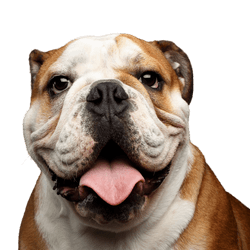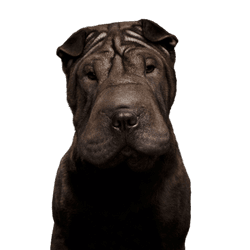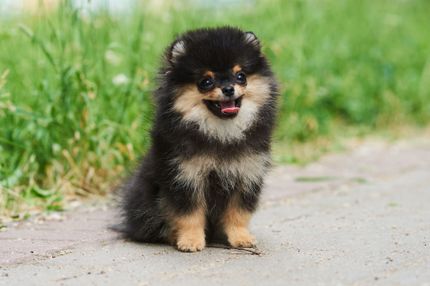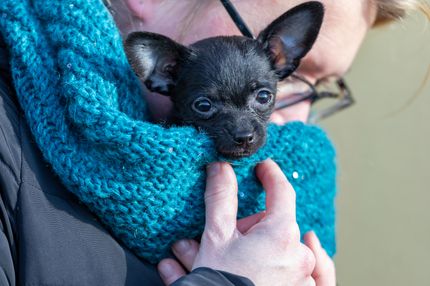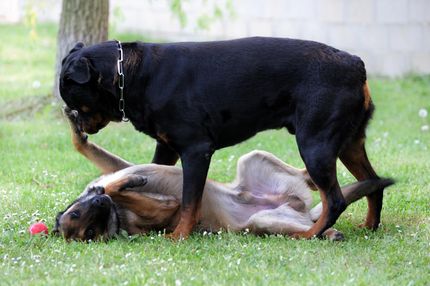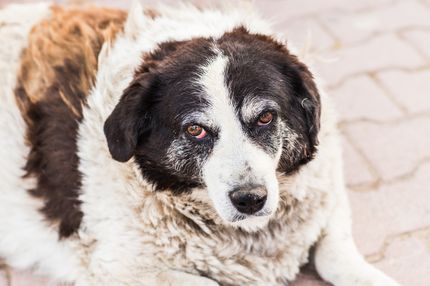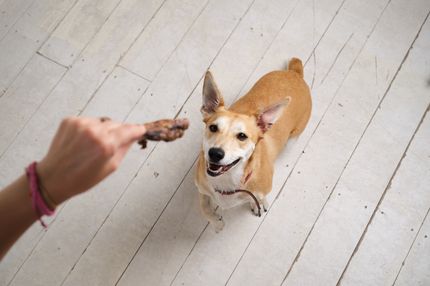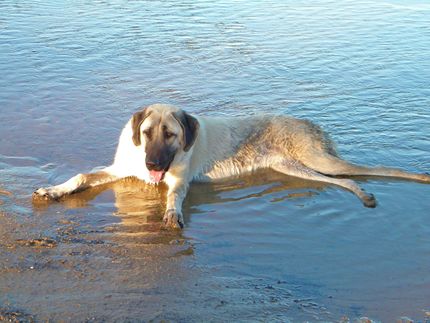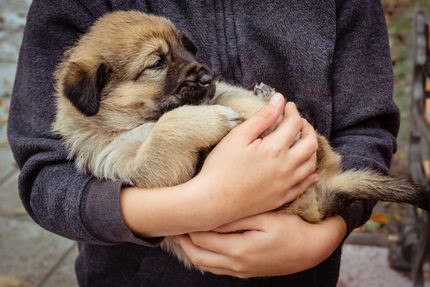Facts & Origin
Origin and development of the Bull-Pei
The Bull-Pei is a so-called designer dog that is the result of the deliberate crossbreeding of a Shar-Pei with an English Bulldog. The aim of this hybridization was to combine the robust but often health-prone characteristics of the Bulldog with the independence, intelligence and exoticism of the Shar-Pei. Both parent breeds originally come from Asia and Europe respectively and have a long history as companion and guard dogs.
The targeted breeding of the Bull Pei probably began in the USA in the late 1980s or early 1990s, when hybrid breeds became increasingly popular. The idea behind this was to create a compact, family-friendly breed with a striking appearance that would be both urban-friendly and affectionate. To this day, however, the Bull-Pei is not recognized by official canine associations such as the FCI or AKC, which means that there are no fixed standards.
Name synonyms and possible confusion
The Bull-Pei is known by various names, including:
Shar-Pei Bulldog Mix
Bull Shar-Pei
More rarely also simply as Pei-Bulldog
Caution: The Bull Pei should not be confused with the Miniature Bull Pei, which also comes from the Shar-Pei line, but has been bred to Miniature Bulldogs or Pugs. The term "Bull-Pei" is also sometimes incorrectly applied to other Shar-Pei mixes, e.g. American Bullys or Old English Bulldogs.
This variety of names can cause confusion - especially when researching on the Internet or when selecting from a shelter or a kennel, you should ask exactly which breeds have actually been crossed.
Criticism of the Bull-Pei breed
As with many hybrid breeds, there is also criticism of the Bull-Pei, particularly from the animal welfare and veterinary fields. Both parents are considered short-headed (brachycephalic) breeds, which means that they are prone to breathing problems, skin fold infections and orthopaedic diseases.
The idea of producing healthier animals through hybridization is understandable in theory, but is often not consistently implemented in practice. Many bull peis come from breeds without health checks, which can even increase the risk of inherited ailments.
Animal welfare activists and vets therefore warn against trivializing such crossbreeds. Anyone interested in a Bull-Pei should obtain comprehensive information about the parent animals and critically examine whether the breeding was carried out responsibly.
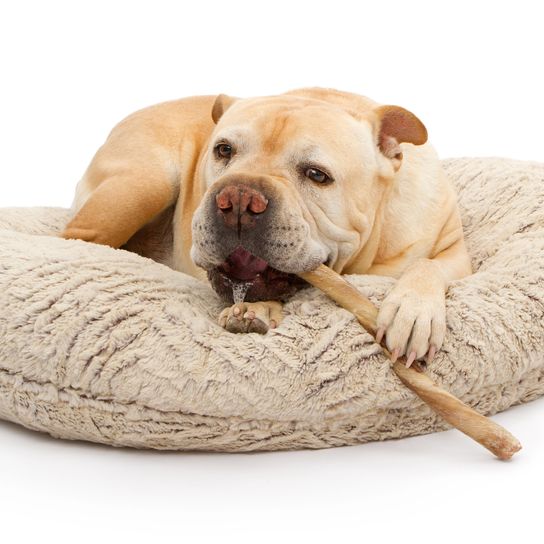


| Alternate Name | Shar-Pei Bulldog Mix, Bull Shar-Pei, Pei-Bulldog |
| Origin | UK - China |
| Life expectancy | 9 - 12 years |
| Care requirements | low-maintenance |
| Activity level | low - average |
| FCI group | not recognised |
| AKC group | not recognised |
| KC group | not recognised |
More English Bulldog mixes
More Shar Pei mixes
Attitude, character and temperament of the breed
Possible character traits of the Bull-Pei
The Bull-Pei typically combines the calm, composed nature of the Bulldog with the independent, sometimes aloof temperament of the Shar-Pei. Many of these dogs are:
affectionate and loyal to their owner,
but also stubborn, reserved and not very playful with strangers,
not very keen to bark, but watchful and attentive.
Training a Bull-Pei requires patience, consistency and empathy. Positive reinforcement is essential - pressure or harshness usually lead to withdrawal or resistance. Early socialization with people, children and other dogs is crucial to prevent insecurities or aggressive tendencies from developing.
A certain stubbornness coupled with high sensitivity is also typical. Bull-Peis are not "working" dogs, but need understanding for their idiosyncrasies. Those who offer this will be rewarded with a deeply connected, alert and calm companion.
Character
Usage
Possible diseases and care requirements
The Bull-Pei presents some health challenges, as both parent breeds are prone to hereditary problems. Common diseases can include
Skin fold inflammation and allergies, especially with excessive wrinkling
Brachycephalic airway syndrome if the head has been bred too short
Hip dysplasia and elbow problems
Eye disorders such as entropion (rolling of the eyelids)
Obesity and associated secondary problems
Care of the coat and skin folds requires attention: regular cleaning of the folds (e.g. with a damp cloth), checking for redness and, if necessary, medical care products are part of the routine. The coat itself is usually short and easy to care for, but loses hair noticeably when the coat is changed.
A good diet with skin support (e.g. omega-3 fatty acids), sufficient exercise - adapted to the individual energy level - and regular visits to the vet to check the skin, eyes and joints are also important.

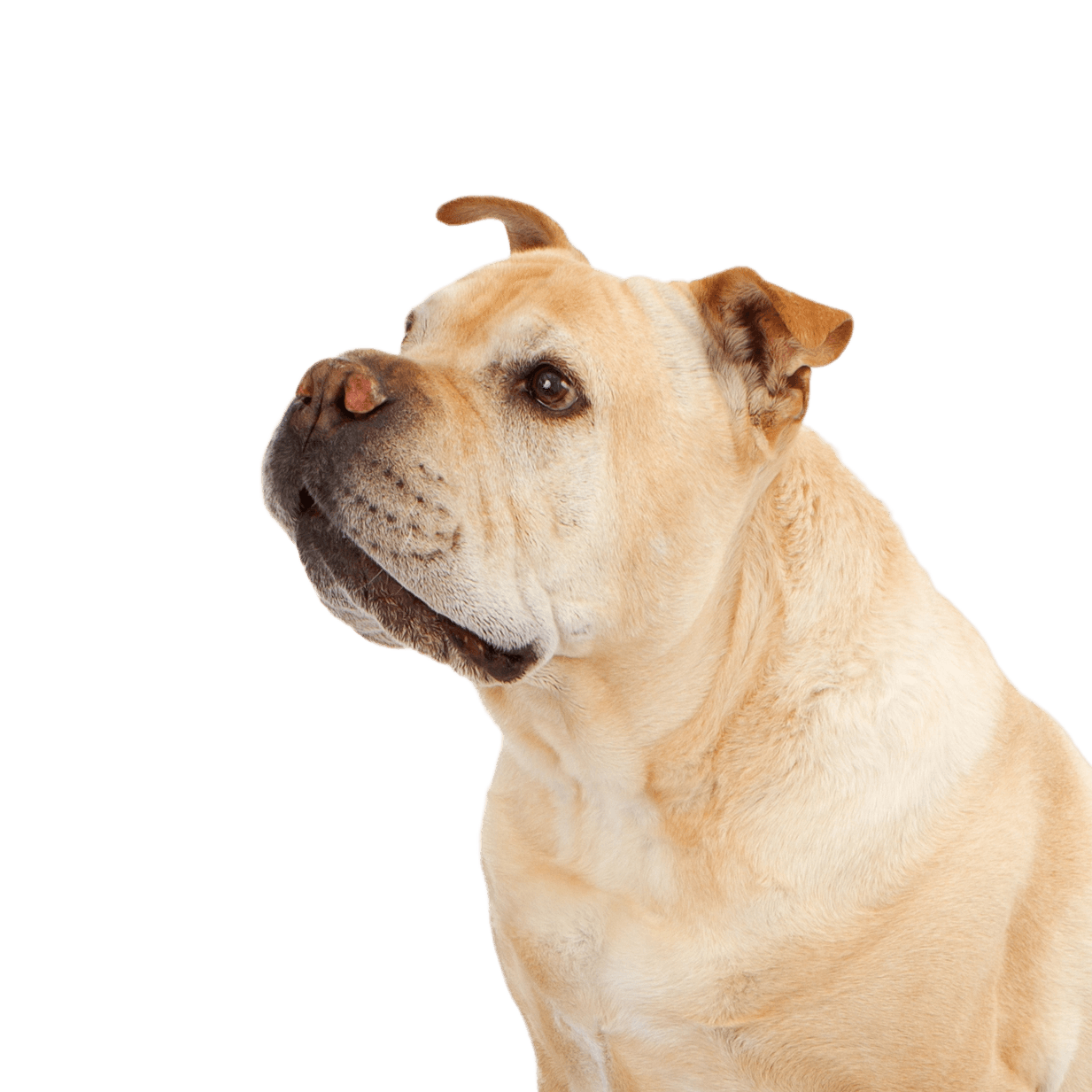
Possible appearance of the Bull-Pei
Visually, the Bull-Pei is an impressive mix: usually compact, muscular and with a striking face. Typical features are
broad skull, sometimes flatter than the Shar-Pei, with a short muzzle
striking facial wrinkles, more or less pronounced depending on genetic influence
strong, deep chest, strong forelegs
Medium-length to short coat, dense and smooth
Almond-shaped eyes, often deep-set
Ears small, triangular and close fitting
The height at the withers is usually between 40 and 50 cm, the weight between 18 and 30 kg, whereby males are usually more strongly built. Colors range from beige, fawn, brown, black to brindle - often with a dark mask.
The expression is often serious or dignified, which is reinforced by the wrinkled face. Overall, the Bull-Pei conveys strength, calmness and strength of character - a dog that does not want to please everyone, but is often very closely bonded to its owner.
Known Diseases
Eye diseases
Often occur with allergies and intolerances.
Skin inflammations
Can be hereditary in certain breeds.
Heart disease
Can occur frequently in dogs and can sometimes be treated with medication.
Breathing problems
Dogs with shortened muzzles can often experience respiratory problems.
Amyloidosis
Amyloidosis refers to a group of diseases that share a common feature: the pathological abnormal deposition of a fibrous protein called amyloid in various tissues of the body. Several organs are often involved.
FAQ
-
A Bull-Pei is a cross between an English Bulldog and a Shar-Pei.
-
A Bull-Pei can look different, but typically has the head and body shape of an English Bulldog with the wrinkles of a Shar-Pei.
-
Bull peis can grow to be small to medium sized, depending on the size of their parents. They usually weigh between 18-25 kg.
-
English Bulldog and Shar-Pei mixes are generally friendly and good-natured, but can sometimes be strong-willed and stubborn. They generally get on well with other dogs and children.
-
Yes, Bull-Peis are generally good pets. They are generally affectionate and easy to train.

